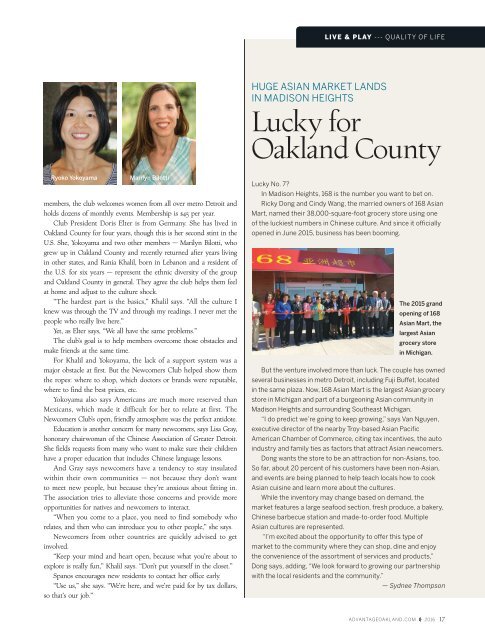PROSPER®
1Z66deW
1Z66deW
Create successful ePaper yourself
Turn your PDF publications into a flip-book with our unique Google optimized e-Paper software.
LIVE & PLAY --- QUALITY OF LIFE<br />
HUGE ASIAN MARKET LANDS<br />
IN MADISON HEIGHTS<br />
Lucky for<br />
Oakland County<br />
Ryoko Yokoyama<br />
Marilyn Bilotti<br />
members, the club welcomes women from all over metro Detroit and<br />
holds dozens of monthly events. Membership is $45 per year.<br />
Club President Doris Elter is from Germany. She has lived in<br />
Oakland County for four years, though this is her second stint in the<br />
U.S. She, Yokoyama and two other members — Marilyn Bilotti, who<br />
grew up in Oakland County and recently returned after years living<br />
in other states, and Rania Khalil, born in Lebanon and a resident of<br />
the U.S. for six years — represent the ethnic diversity of the group<br />
and Oakland County in general. They agree the club helps them feel<br />
at home and adjust to the culture shock.<br />
“The hardest part is the basics,” Khalil says. “All the culture I<br />
knew was through the TV and through my readings. I never met the<br />
people who really live here.”<br />
Yet, as Elter says, “We all have the same problems.”<br />
The club’s goal is to help members overcome those obstacles and<br />
make friends at the same time.<br />
For Khalil and Yokoyama, the lack of a support system was a<br />
major obstacle at first. But the Newcomers Club helped show them<br />
the ropes: where to shop, which doctors or brands were reputable,<br />
where to find the best prices, etc.<br />
Yokoyama also says Americans are much more reserved than<br />
Mexicans, which made it difficult for her to relate at first. The<br />
Newcomers Club’s open, friendly atmosphere was the perfect antidote.<br />
Education is another concern for many newcomers, says Lisa Gray,<br />
honorary chairwoman of the Chinese Association of Greater Detroit.<br />
She fields requests from many who want to make sure their children<br />
have a proper education that includes Chinese language lessons.<br />
And Gray says newcomers have a tendency to stay insulated<br />
within their own communities — not because they don’t want<br />
to meet new people, but because they’re anxious about fitting in.<br />
The association tries to alleviate those concerns and provide more<br />
opportunities for natives and newcomers to interact.<br />
“When you come to a place, you need to find somebody who<br />
relates, and then who can introduce you to other people,” she says.<br />
Newcomers from other countries are quickly advised to get<br />
involved.<br />
“Keep your mind and heart open, because what you’re about to<br />
explore is really fun,” Khalil says. “Don’t put yourself in the closet.”<br />
Spanos encourages new residents to contact her office early.<br />
“Use us,” she says. “We’re here, and we’re paid for by tax dollars,<br />
so that’s our job.”<br />
Lucky No. 7?<br />
In Madison Heights, 168 is the number you want to bet on.<br />
Ricky Dong and Cindy Wang, the married owners of 168 Asian<br />
Mart, named their 38,000-square-foot grocery store using one<br />
of the luckiest numbers in Chinese culture. And since it officially<br />
opened in June 2015, business has been booming.<br />
The 2015 grand<br />
opening of 168<br />
Asian Mart, the<br />
largest Asian<br />
grocery store<br />
in Michigan.<br />
But the venture involved more than luck. The couple has owned<br />
several businesses in metro Detroit, including Fuji Buffet, located<br />
in the same plaza. Now, 168 Asian Mart is the largest Asian grocery<br />
store in Michigan and part of a burgeoning Asian community in<br />
Madison Heights and surrounding Southeast Michigan.<br />
“I do predict we’re going to keep growing,” says Van Nguyen,<br />
executive director of the nearby Troy-based Asian Pacific<br />
American Chamber of Commerce, citing tax incentives, the auto<br />
industry and family ties as factors that attract Asian newcomers.<br />
Dong wants the store to be an attraction for non-Asians, too.<br />
So far, about 20 percent of his customers have been non-Asian,<br />
and events are being planned to help teach locals how to cook<br />
Asian cuisine and learn more about the cultures.<br />
While the inventory may change based on demand, the<br />
market features a large seafood section, fresh produce, a bakery,<br />
Chinese barbecue station and made-to-order food. Multiple<br />
Asian cultures are represented.<br />
“I’m excited about the opportunity to offer this type of<br />
market to the community where they can shop, dine and enjoy<br />
the convenience of the assortment of services and products,”<br />
Dong says, adding, “We look forward to growing our partnership<br />
with the local residents and the community.”<br />
— Sydnee Thompson<br />
ADVANTAGEOAKLAND.COM 2016 17


